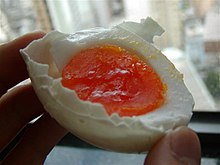
Back Sugok na maasgad BCL Hintalu bajaruk BJN Ou d'ànec en salaó Catalan Huevo de pato en salazón Spanish Telur asin ID 鹹蛋 Japanese Endhog asin JV 셴야단 Korean Telur masin Malay Endog asin Sundanese
This article needs additional citations for verification. (July 2011) |
 | |
| Place of origin | China |
|---|---|
| Main ingredients | Duck egg in brine |
| Salted duck egg | |||||||||||||
|---|---|---|---|---|---|---|---|---|---|---|---|---|---|
| Chinese name | |||||||||||||
| Traditional Chinese | 1. 鹹鴨蛋 2. 鹹蛋 | ||||||||||||
| Simplified Chinese | 1. 咸鸭蛋 2. 咸蛋 | ||||||||||||
| Jyutping | 1. haam4 aap3 daan6 2. haam4 daan6 | ||||||||||||
| Hanyu Pinyin | 1. xiányādàn 2. xiándàn | ||||||||||||
| Literal meaning | 1. salted duck eggs 2. salted eggs | ||||||||||||
| |||||||||||||
| Alternative Chinese name | |||||||||||||
| Traditional Chinese | 鹹蛋 | ||||||||||||
| Simplified Chinese | 咸蛋 | ||||||||||||
| Literal meaning | salted eggs | ||||||||||||
| |||||||||||||
| Burmese name | |||||||||||||
| Burmese | ဆားဘဲဥ | ||||||||||||
| Vietnamese name | |||||||||||||
| Vietnamese | trứng vịt muối hột vịt muối | ||||||||||||
| Thai name | |||||||||||||
| Thai | ไข่เค็ม (khị khĕm; Literal meaning: salted egg) | ||||||||||||
| Malay name | |||||||||||||
| Malay | telur masin | ||||||||||||
| Indonesian name | |||||||||||||
| Indonesian | telur asin | ||||||||||||
| Filipino name | |||||||||||||
| Tagalog | itlog na maalat itlog na pula | ||||||||||||
| Khmer name | |||||||||||||
| Khmer | ពងទាប្រៃ | ||||||||||||
| Kapampangan name | |||||||||||||
| Kapampangan | ebun malat | ||||||||||||
| Cebuano name | |||||||||||||
| Cebuano | ginamos nga itlog | ||||||||||||
A salted duck egg is an East Asian preserved food product made by soaking duck eggs in brine or packing each egg in damp, salted charcoal. In Asian supermarkets across the Western world, these eggs are sometimes sold covered in a thick layer of salted charcoal paste. The eggs may also be sold with the salted paste removed, wrapped in plastic, and vacuum-packed. From the salt curing process, the salted duck eggs have a briny aroma, a gelatin-like egg white, and a firm-textured, round yolk that is bright orange-red.
Salted duck eggs are normally boiled or steamed before being peeled and eaten as a condiment to congee or cooked with other foods as a flavoring. The texture is gelatin-like egg white and firm and has a perfect round yolk. The egg white has a sharp, salty taste. The orange-red yolk is rich, fatty, and less salty. The yolk is prized and is used in Chinese mooncakes to symbolize the moon.
Salted eggs can also be made from chicken eggs, though the taste and texture will be somewhat different, and the egg yolk will be less rich.
Salted eggs sold in the Philippines undergo a similar curing process, with some variation in ingredients used. They are dyed red (hence called itlog na pula or ‘red eggs' in English) to distinguish them from fresh duck eggs.
© MMXXIII Rich X Search. We shall prevail. All rights reserved. Rich X Search